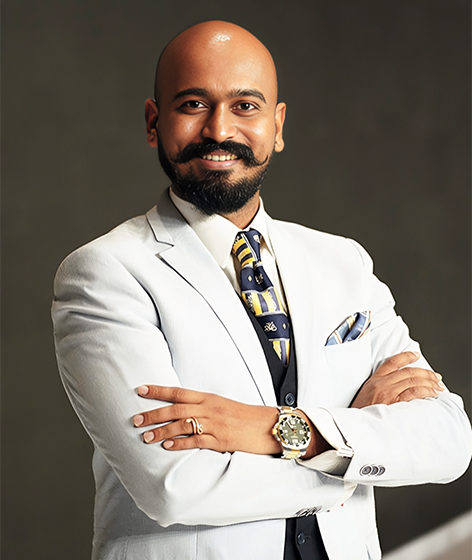Jashanmal Unveils Its Festive Gift Edit Featuring Timeless Luxury Collections
“AI, Ethics, and the Future of Humanity.. A Conversation with Naveen Bharadwaj, Group CEO of Trescon”

In a world where technology is evolving at an unprecedented pace, artificial intelligence (AI) stands at the forefront, reshaping industries, redefining lifestyles, and challenging the boundaries of human imagination. We sat down with Naveen Bharadwaj, Group CEO of Trescon, to explore the deeper narrative behind AI’s rise, its ethical implications, and what the future may hold. In this candid conversation, he sheds light on AI’s origins, its impact on society, and how today’s generation can navigate this powerful tool responsibly and purposefully.
Dubai – UAE, April 28 2025
Can you give us a brief overview of the history of AI for those who might not be very familiar with it?
AI isn’t a recent phenomenon, although it has become much more visible globally in recent years. In reality, we’ve all been interacting with artificial intelligence for the past 15 to 25 years in various forms. However, today, when people talk about AI, they often think only of generative AI—largely due to tools like ChatGPT.
But AI is far broader than just generative models. We have agentic AI, and we’re moving toward what is often referred to as superintelligence. What tools like ChatGPT have done is bring AI into the hands of the general public, leading many of us to explore its capabilities further.
What we’re seeing today is the culmination of decades of research and development. From healthcare to finance, national defense to creative arts, nearly every sector is leveraging AI. Fundamentally, AI combines data, technology, and automation to help us work faster and more intelligently—whether it’s generating reports, coding, making decisions, or streamlining operations.
What’s your advice to the new generation on using AI responsibly?
This is an increasingly common question—and an important one. Many worry that AI could overtake human intelligence or make people obsolete. But I believe it’s about understanding boundaries and using AI ethically.
Young people need to see AI not as a replacement, but as a partner—a tool to enhance their abilities. Use it to learn, research, ideate, and accelerate your work—but don’t rely on it blindly. AI is fast, but it’s not emotionally intelligent. It lacks creativity and empathy—qualities that are still uniquely human.
AI should be used to complement human intelligence, not replace it. It’s also vital to understand that AI is not just generative; there are various layers and applications of AI. Embracing those layers thoughtfully will allow this generation to use AI meaningfully in both their personal and professional lives.
Are you worried AI might replace your job someday?
Not at all. Technological revolutions have always created disruptions—think of the industrial revolution or the digital age. But with every wave of change, new roles are created.
If we lose our jobs to AI, it’s not because of AI—it’s because we failed to adapt. The key is to continuously upskill, reskill, and stay future-ready. Those who evolve with technology will thrive alongside it.
What about the ethical concerns—how do we ensure AI is used for good, not harm?
This is a topic being taken very seriously across sectors—governments, private industries, academia, and civil societies are all actively discussing AI ethics.
Like any tool, AI can be misused—cybersecurity threats, data breaches, deepfakes, and misinformation are real concerns. But the solution lies in designing AI with governance in mind—ensuring cybersecurity, risk management, human oversight, and ethical boundaries are built into the system from day one.
Equally important is raising awareness. Not everyone understands AI the same way. We must educate people across age groups, geographies, and backgrounds so that they can use AI wisely and safely.
Will AI change our lifestyles?
Absolutely. AI is already transforming how we work, live, and interact. Tasks that once took days or weeks can now be completed in minutes. That gives us something we’ve all longed for: time.
People have often said they don’t have enough time to spend with family, pursue hobbies, or focus on personal well-being. AI has the potential to give that time back—reducing burnout and enabling better life balance. But whether we use that time wisely is still up to us.
How might AI affect family relationships?
That largely depends on the family and the culture. Overuse of any technology can cause disconnect—but if we use AI to enhance our lives, it can actually strengthen bonds.
If AI gives us more time, we can use that time to be present with our families, reduce stress, and improve mental health. It’s all about balance and intentional use.
Do you see new phases of AI emerging in the near future—like Pro AI or Ultra AI?
Yes, the future of AI includes several evolutionary stages. We’re already seeing signs of superintelligence, where machines might eventually match or exceed human cognitive abilities in many areas.
We might see AI systems that evolve on their own, optimize themselves, and take on increasingly complex tasks. But we must approach this future with caution, collaboration, and conscience.
As new technologies emerge, the goal should always be to solve real-world problems—poverty, food security, education, healthcare, and sustainability. If we use AI to address these global challenges, we’re on the right track.
Final Thoughts?
Tomorrow’s world will be shaped by how we use AI today. Whether in solving global challenges or redefining personal lifestyles, AI will be a critical partner in our journey. But it’s not just about innovation—it’s about intent, ethics, and human values. If we keep those at the center, the future will be one we can all be proud of.








